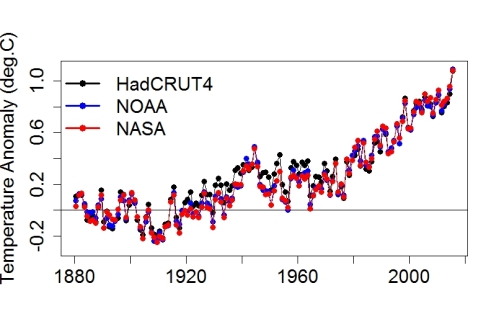One quote from today’s NASA/NOAA press conference on global climate stands out in my mind. At one point a journalist asked a question starting with “If this trend continues…” Gavin Schmidt’s response begin, “It’s not a question of if…”
Today marked the release of global temperature data from NASA, NOAA, and HadCRU. They all show that 2015 was the hottest year on record, by a long shot:
If you like what you see, feel free to donate at Peaseblossom’s Closet.




Gavin also said that if 2016 was higher (which it seems is likely: http://www.bbc.co.uk/news/science-environment-35354579) then that will be three record years in a row, which—he said—will be unprecedented.
Seems the ‘pause’ got put on pause.
At one point a journalist asked a question starting with “If this trend continues…”
_ _ _
Said journalist probably has a minor in economics and believes that if everyone sells, the market will have to respond by lowering the temperatures.
Market forces could potentially lower the temperature by putting a price on carbon. Funny how libertarian and free market conservatives won’t follow what their own economic theories tell them.
And the funny thing is you don’t even have to raise taxes – – with a revenue neutral carbon tax. Whatever increase in revenue results from the carbon tax can be used to reduce other taxes (sales, income or corporate) by the same amount. What reason would someone who is genuinely pro free market have for opposing that?
Timothy- Yes, very good point that I left off. Paying for externalities is well within the economic theory of most any political party, as long as the money is returned fairly. It makes something that you want to reduce more expensive, which leads to less of it.
That is why conservatives and Libertarian denialsts desperately need for there NOT to be any externalities.
> If you like what you see..
No, I don’t like what I see.
I see rapid climate change.
“Accounting for interannual variability, it is fair to say that global warming has now reached ~1 °C.”
(http://www.columbia.edu/~jeh1/mailings/2016/20160120_Temperature2015.pdf)
ukfub, last year was 1.33 °C hotter than the coldest year on record (1909), and could already be 1.25 °C above pre-industrial (going by something Mike Mann wrote, about it having already warmed by 0.3 C by 1900.)
It is not fair to take the coldest year. Also without long-term trend the warmest record would be (let me guess) 0.4°C warmer than the coldest record.
Victor, how do you know that it wouldn’t have been an equally cold outlier if it hadn’t been for climate change?
Because if it were an equal outlier, then sou’s comment would be an accurate summation.
It is difficult for a warm record to also be a cold outlier.
I think 1°C is correct. 1900 was not (so much) warmer than pre-industrial except you start in the little ice age in the 17th century or the cool decades after the major 1808/09 and 1815 volcanic eruptions.
Not entirely on topic, but after a long hiatus (a real one) I’ve relaunched the Deep Climate blog.
My first post:
Coverage bias and recent trends in global surface temperature
[T]he discrepancy between very short-term and multi-decadal trends in the observations appears to have been exaggerated in prior estimates, including IPCC AR5.
Comparison of 5 fully interpolated SAT series to the IPCC “3”
Part 2 will look at 2015 in context and show how the four major operational GMST series have converged somewhat of late. Coverage bias or no, they all have 2015 as the warmest year on record by a long shot, as seen in this chart.
Global surface temperature 1996-2015
Welcome back, Deep. You were sorely missed :-\
Also glad to see you back! You have done some really good work in the past.
Indeed a welcome return.
There’s been no detectable warming since 2015 and there’s snow on the ground where I am. Take that, warmists!
Personally I find the collapse in oil prices worrisome at this juncture. Suddenly, gasoline is the same price as it was at the time of Kyoto. Seems almost certain that it will lead to increased gasoline usage unless states jack up gas taxes (or reduce gas subsidies).
Take heart, price is not the only influence on consumers. Provision of alternatives and motivated decision making will still have an effect. If all goes well, 100 years from now gasoline will still be on sale but it will be unwanted except by the few.
‘If all goes well’ is an increasingly optimistic outlook, especially if price isn’t used to move the knob _much_ faster than it’s currently moving.
Which you could do now without any pain.
Susan Anderson (and XX online) asked below an older post, where the comments are closed: “What laypeople like me need is something along the lines of “temperature records for dummies”.”
Such an article has been published today on Ars Technica. A comprehensive, accessible and accurate article on how the temperature trends are computed.
Thorough, not thoroughly fabricated: The truth about global temperature data
For years I’ve been hearing that the world has warmed 0.8K since preindustrial times. Now, suddenly, it’s 1.0K. Whatever happened to 0.9K?
You probably heard that the temperature trend since 1880 is 0.8°C per century. 1880 is more than a century in the past.
No. I don’t think I’ve ever seen the rate per century mentioned.
Basically, 2015 happened. We’d been talking all decade about 0.7 or 0.8 C warming. And 2010 was warmest in most instrumental records, at 0.7 (per NCEI, formerly NCDC, and often referred to by the name of the parent organization, NOAA.) So, that’s pretty close.
Sure, 2014 moved the needle, but not by much–NCDC pegged it at 0.74 C.
But last year, the NCDC figure was 0.9 C. Call it ‘hopscotch’, I guess.
http://www.ncdc.noaa.gov/sotc/global/201513
Any equivalent of BEST – or anyone for that matter – doing independent analyses of satellite data?